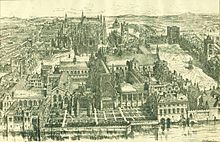Henry Scobell

Henry Scobell (baptised 1610; died 1660)[1] was an English Parliamentary official, and editor of official publications. He was clerk to the Long Parliament, and wrote on parliamentary procedure and precedents.
Life[edit]

Initially under-clerk of the parliaments, Scobell became Clerk of the House of Commons from 5 January 1649, his predecessor Henry Elsynge having resigned. Scobell also held a position as censor of publications, and then was Clerk of the Parliaments for life with effect from 14 May 1649.[3] He was the first editor, from 9 October 1649, of Severall Proceedings in Parliament, an early official newspaper, and the second of Parliament's publications.[4]
In the Rump Parliament, Scobell found himself in the middle of the clashes leading to its dissolution in 1653.[5] He remained Clerk to Barebone's Parliament.[6]
From 1655 Scobell became Clerk to the Council of State, a large jump in status, in succession to John Thurloe and sharing the position with William Jessop.[7] Up to then he had been for a period an assistant secretary to the council.[8]
In 1658, as a preliminary to the Savoy Assembly, Scobell called together elders of Independent churches from the London area, in the house of George Griffith (bishop).[9] He himself was an elder of the Congregational church of John Rowe, meeting in Westminster Abbey.[10]
In October 1659 he was one of those calling on George Monck to intervene in the vacuum of power after the death of Oliver Cromwell.[11]
Works[edit]
- Memorials of the Method and Maner of Proceedings in Parliament in Passing Bills. Together with Several Rules and Customs, which by Long and Constant Practice have Obtained the Name of Orders of the House. Gathered by Observation, and out of the Journal Books from the Time of Edward 6, London: Printed by Henry Hills and John Field, printers to His Highness, 1656, OCLC 606895390.
- A Collection of Acts and Ordinances of General Use, Made in the Parliament, Begun and Held at Westminster, the Third Day of November, anno 1640: And since, unto the Adjournment of the Parliament Begun and Holden the 17th of September, Anno 1656, and formerly Published in Print, which are here Printed at Large with Marginal Notes, or Abbreviated: Being a Continuation of that Work from the End of Mr. Pulton's Collection: In 2 Parts: Together with Several Tables of the Titles of, and Principal Matters Contained in the said Acts and Ordinances, and likewise of such as being of more Private and Particular Concernment, or less Use, or Omitted, London: Printed by Henry Hills and John Field ..., 1657–1658, OCLC 802073701.
- The Povver of the Lords and Commons in Parliament in Point of Judicature briefly Discours'd. At the Request of a Worthy Member of the House of Commons, London: s.n., 1680, OCLC 228723004.
Notes[edit]
- ^ Sean Kelsey (January 2008) [September 2004]. "Scobell, Henry (bap. 1610, d. 1660)". Oxford Dictionary of National Biography. Oxford Dictionary of National Biography (online ed.). Oxford University Press. doi:10.1093/ref:odnb/24845. Retrieved 16 September 2015. (Subscription or UK public library membership required.).
- ^ H.S. E. C.P. [Henry Scobell, Esquire, Clerk of Parliament] (1670), Memorials of the Method and Manner of Proceedings in Parliament in Passing Bills. Together with several Rules & Customs, which by Long and Constant Practice have Obtained the Name of Orders of the House. Gathered by Observation, and out of the Journal Books from the Time of Edward 6 (3rd ed.), London: s.n., OCLC 7185722
{{citation}}: CS1 maint: multiple names: authors list (link). - ^ C[harles] H[arding] Firth (1911), "Introduction", in C. H. Firth; R[obert] S[angster] Rait (eds.), Acts and Ordinances of the Interregnum, 1642–1660, vol. 3, London: His Majesty's Stationery Office, OCLC 277167908, archived from the original on 5 September 2015.
- ^ Joad Raymond (1996), The Invention of the Newspaper: English Newsbooks, 1641–1649, Oxford; New York, N.Y.: Clarendon Press; Oxford University Press, p. 75, ISBN 978-0-19-813002-4; Adolphus William Ward; A. W. Waller; William P. Trent (2000), "The Beginnings of English Journalism", The Cambridge History of English and American Literature: An Encyclopedia in Eighteen Volumes. Volume VII. Cavalier and Puritan, New York, N.Y.: Bartleby.com, OCLC 43357720, archived from the original on 10 September 2015.
- ^ The Clerk of the House [General Series; factsheet G13] (PDF), House of Commons Information Office, January 2003, p. 4, archived from the original (PDF) on 15 September 2003.
- ^ Austin Woolrych (1982), Commonwealth to Protectorate, Oxford; New York, N.Y.: Clarendon Press; Oxford University Press, p. 152, ISBN 978-0-19-822659-8.
- ^ Robert Thomas Fallon (1993), Milton in Government, University Park, Pa.: Pennsylvania State University Press, p. 130, ISBN 978-0-271-00904-9.
- ^ Philip Aubrey (1990), Mr Secretary Thurloe: Cromwell's Secretary of State, 1652–1660, London; Rutherford, N.J.: Athlone Press; Fairleigh Dickinson University Press, p. 38, ISBN 978-0-8386-3388-5.
- ^ Richard L. Greaves (1985), Saints and Rebels: Seven Nonconformists in Stuart England, Macon, Ga.: Mercer University Press, p. 86, ISBN 978-0-86554-136-8.
- ^ Peter Toon (1973), "The Savoy Declaration of Faith", Puritans and Calvinism, Swengel, Pa.: Reiner Publications, OCLC 701999, archived from the original on 5 February 2012; Francis J. Bremer; Tom Webster, eds. (2006), Puritans and Puritanism in Europe and America: A Comprehensive Encyclopedia, Santa Barbara, Calif.: ABC-CLIO, p. 533, ISBN 978-1-57607-678-1.
- ^ Dai Liu (1973), Discord in Zion: The Puritan Divines and the Puritan Revolution 1640–1660 [Archives internationales d'histoire des idées; 61], The Hague: Martinus Nijhoff Publishers, p. 165, ISBN 978-90-247-5156-3.
External links[edit]
- . Dictionary of National Biography. London: Smith, Elder & Co. 1885–1900.
- Henry Scobell: King Charles I Trial - UK Parliament Living Heritage


 French
French Deutsch
Deutsch